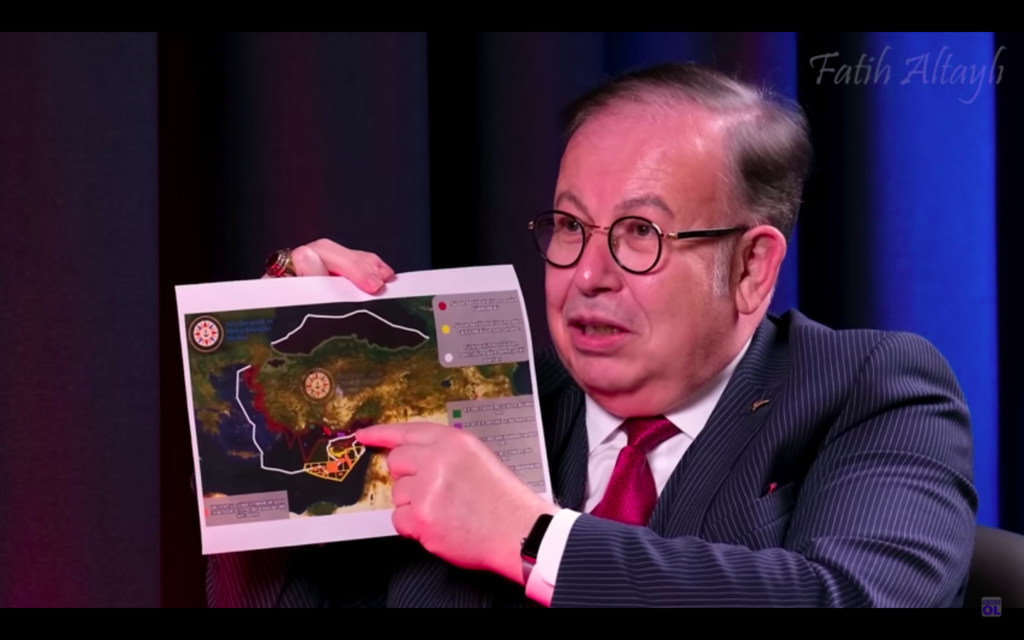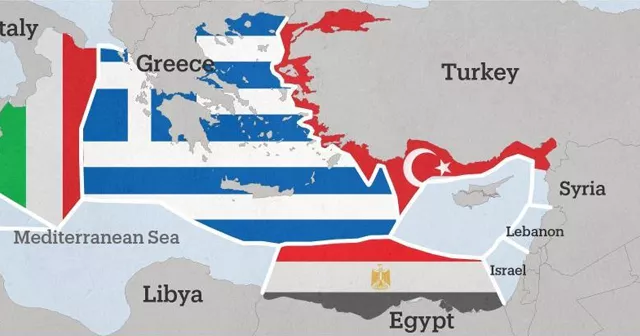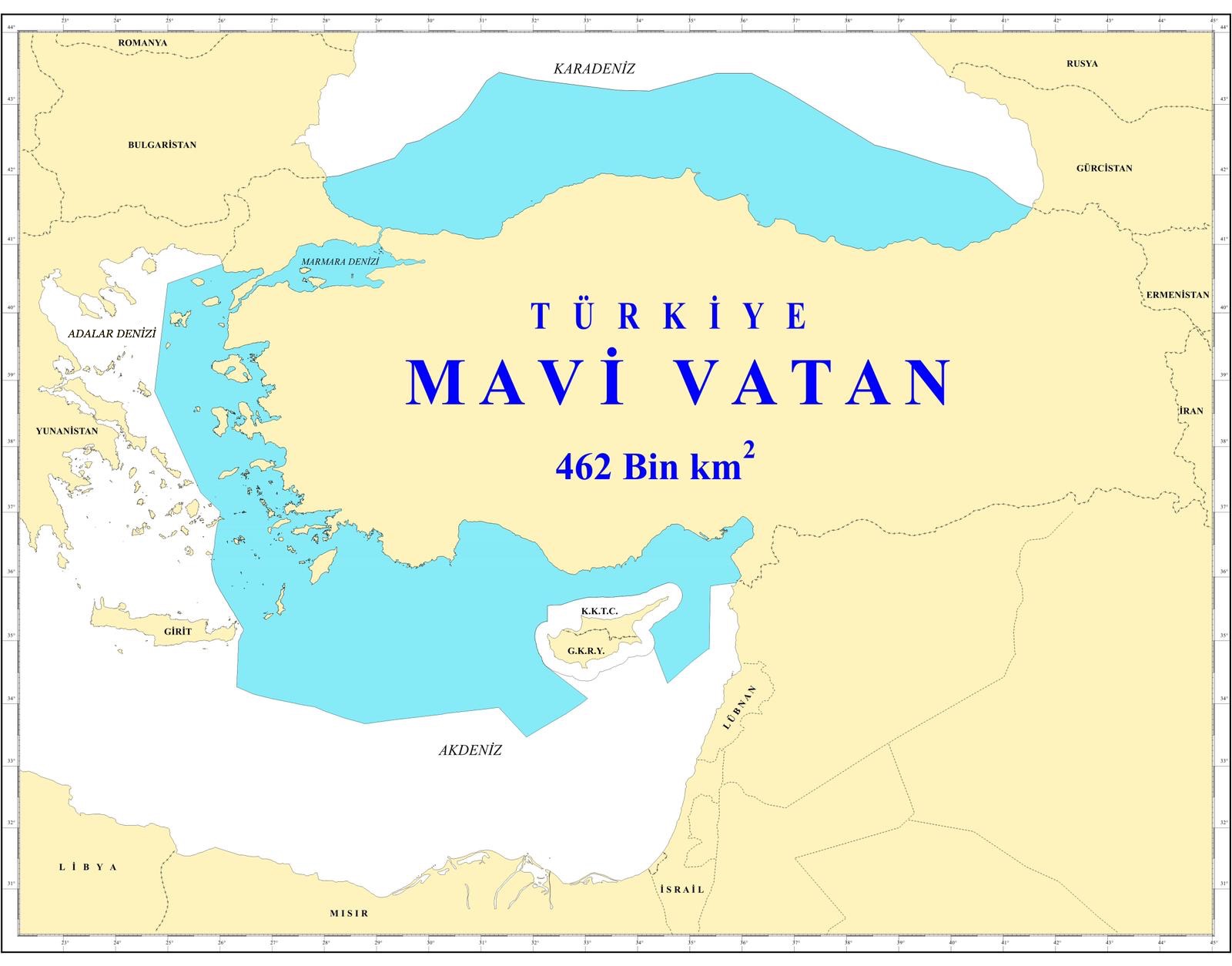Levent Kenez/Stockholm
An ultranationalist retired admiral, known as the architect of Blue Homeland (Mavi Vatan), an aggressive naval doctrine identified with Turkey’s policy in the Mediterranean, claimed that Turkey has been acting in accordance with the controversial Seville Map, which supports Greek claims in the eastern Mediterranean, in an attempt to foster better relations with the European Union since 2020.
During a YouTube program on September 2, when asked about Turkey’s reduced activity in the eastern Mediterranean compared to previous periods and the increased activity of other countries, retired admiral Cihat Yaycı, who leads the Turkish Maritime and Global Strategies Center, claimed that Turkey, as of December 22, 2020, had not crossed into areas marked as Greek territorial waters on the Seville Map. Displaying a copy of the map, Yaycı asserted that Turkey has implicitly accepted it.
“… We didn’t recognize this map. I believe that starting from 2020, all our activities were carried out within the boundaries of the Seville Map, possibly to foster good relations with the European Union and to escape EU criticism,” he added.
Yaycı also pointed out that the only exception to applying the Seville Map was the territorial waters between Turkey and the Turkish Republic of Northern Cyprus (KKTC), a breakaway state recognized only by Turkey. He said it was made possible through an agreement signed between the two states.

Furthermore, Yaycı also mentioned that since December 22, 2020, Turkish NAVTEX notifications, specifically for drilling and seismic research vessels, officially touch upon the boundaries of the Seville Map but do not extend beyond it.
When asked whether Turkey has currently abandoned Blue Homeland, Yaycı said Turkey does not actively assert its claims in the areas falling under Blue Homeland. He reinforced this view by referencing the last known location of the Abdülhamit Han drill ship. Additionally, Yaycı emphasized that Turkey cannot boast about not allowing other countries into the areas in the eastern Mediterranean where it does not operate because it is already at a loss by not utilizing the areas it rightfully owns.
The Seville Map is a study prepared at the request of the European Union by academics Juan Luis Suárez de Vivero and Juan Carlos Rodríguez Mateos from the University of Seville in the early 2000s. Hence, it is referred to as the Seville Map.

It was developed to resolve a dispute over the Exclusive Economic Zone (EEZ) question in the eastern Mediterranean among Turkey, Greece and Cyprus.
This map delineates Greece’s continental shelf according to the borders of Greek islands, regardless of how close they are to Turkey. According to the map, Greece’s continental shelf, starting from the island of Meis (Kastellorizo), extends southward into the middle of the Mediterranean, leaving Turkey with no access to the Mediterranean except for the Gulf of Antalya.
On September 21, 2020 the US Embassy in Ankara emphasized that Washington refrains from taking stances on the maritime borders of other nations and stated that the Seville Map holds no legal significance from the US perspective.
“With respect to the ‘legal status’ of the Seville map, the United States does not consider the Seville Map to have any legal significance. We understand the European Union does not consider the Seville map to be a legally binding document,” the statement reads.
The EU had decided to impose sanctions on Turkey in 2019 due to its drilling and oil exploration activities in the eastern Mediterranean. The sanctions were extended for one year and expired in November 2022.
Yaycı is among the close associates of President Recep Tayyip Erdogan. He was with Erdogan during an unsuccessful coup attempt on July 15, 2016 and was heard whispering to Erdogan during the president’s televised address on CNNTürk that night. After the abortive putsch, Yaycı played a crucial role in the purge of Erdogan’s opponents and pro-NATO officers from the military. He is also the developer of software called “Fetometre,” which was employed to identify members of the Gülen movement, a group critical of Erdogan.
Last month, Yaycı launched a campaign to obstruct the annual ritual of the Assumption of Mary, organized by the Ecumenical Patriarchate in İstanbul, which took place on August 15 at Sümela Monastery in the northeastern Turkish province of Trabzon.

On August 3 a tweet from Yaycı’s think tank’s official account contained derogatory language directed at Ecumenical Patriarch Bartholomew I, the spiritual leader of Eastern Orthodox Christians worldwide, along with claims that holding the ceremony violates the Treaty of Lausanne, an international agreement signed in 1923 that defined borders and established peace between Turkey and the Allied Powers, including Greece, after World War I.
Pointing out that August 15 commemorates the anniversary of the Ottoman conquest of Trabzon, the statement contended that the ceremony would be interpreted as disrespect towards the country’s Ottoman ancestors. It alleged that the ritual’s objective was to either erase or cast doubt on the history of Trabzon’s conquest, thus advancing the narrative that these lands originally belonged to Greece.
The statement further said, “The purpose of this ceremony is to obliterate the memory of Trabzon’s conquest or, at the very least, cast a shadow over it, thereby promoting the ambitions of the Megali Idea.”
The Megali Idea is a nationalist plan aiming at setting up a Greek state in line with the former borders of the Byzantine Empire.
Despite strong reactions from ultranationalist and Islamist circles, the ceremony was still held.












